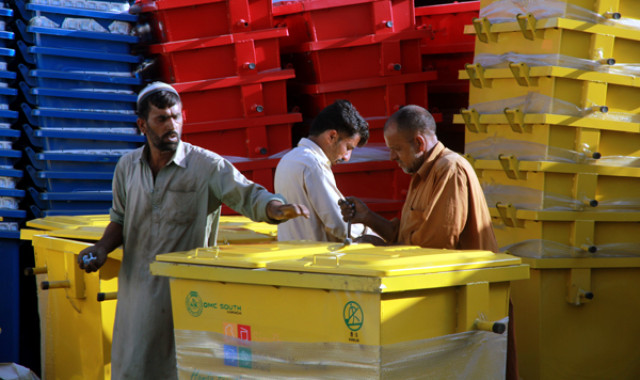Solutions to sustainable waste management
Experts suggest finding solutions to introduce waste segregation at household level

The two-day Hackathon hosted by the Institute of Urbanism (IoU) to work out the best possible solutions to sustainable waste management emphasised the need to utilise waste as a resource for co-creating solutions for promoting youth-led recycling in the cities.
The Hackathon was organised under the programme Green Urban Development (GUD). It was jointly initiated by IoU and the School of Leadership Foundation with the support of the US Embassy in Islamabad from March 2-3. Representatives from academia, youth, researchers, media, government and private sector attended the event.
The hackathon aimed to find solutions to introduce at-source waste segregation at the household level in cities while integrating the informal waste management stakeholders in a socially and economically just manner.
The speakers at the forum highlighted that Islamabad generates approximately 1,575 tons of municipal waste daily, with a low recycling rate, plastic waste generated in the city is estimated to be 14.26 per cent of the total waste. Moreover, there is also a lack of availability of updated waste-related data to come up with need-based waste solutions, and no policy at the national level exists which may provide a comprehensive framework for waste minimisation or utilisation of waste as a resource.
IoU Senior Programme Fellow Dr Ejaz Ahmad highlighted that the informal sector plays a critical role in recovering recyclables before waste reaches the dumpsite and the private sector plays a role in recycling it. Yet the efforts are being made in silos instead of being coordinated. In addition to the lack of policies, there is also a lack of awareness among communities on how to sustainably deal with waste.
IoU Senior Program Coordinator, Ayesha Majid, underscored that formalising segregation at source and recycling at the community level will require a focus on culturally-rooted messaging, capacity building on how to turn waste into resources, and platforms which promote partnerships among different stakeholders including the government, youth, academia, private sector and the media.
Fatima Jinnah Women's University’s Assistant Professor, Dr Abida Sharif said awareness about waste-wise practices needs to be a part of the curriculum at an early age education to promote civic sense regarding sustainable waste management. The government should also create and promote pathways to create an eco-system for waste-related initiatives and businesses.
Samia Afridi, Senior Programme Manager at the School of Leadership Foundation, stated, "This Hackathon is a testament to the power of collaboration and innovation in tackling complex societal issues. By bringing together diverse stakeholders, we can harness the creativity and energy of youth to drive meaningful change in waste management practices.
The 2-day Hackathon catalyzed fostering collaboration and innovation in addressing Pakistan's waste management challenges. It underscored the critical role of youth-led initiatives in promoting sustainable solutions and highlighted the urgent need for comprehensive policies and coordinated efforts across sectors.

1724319076-0/Untitled-design-(5)1724319076-0-208x130.webp)

















COMMENTS
Comments are moderated and generally will be posted if they are on-topic and not abusive.
For more information, please see our Comments FAQ